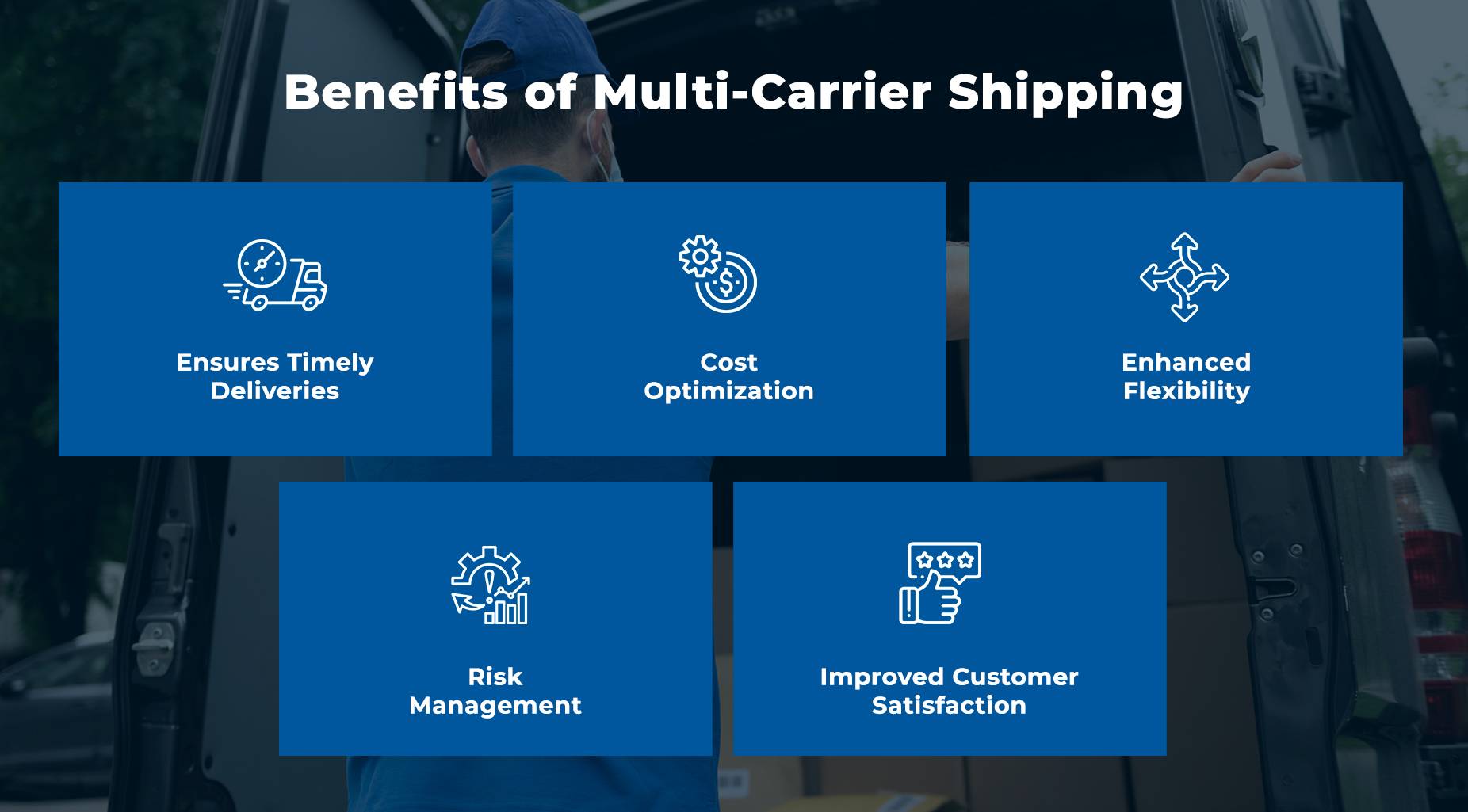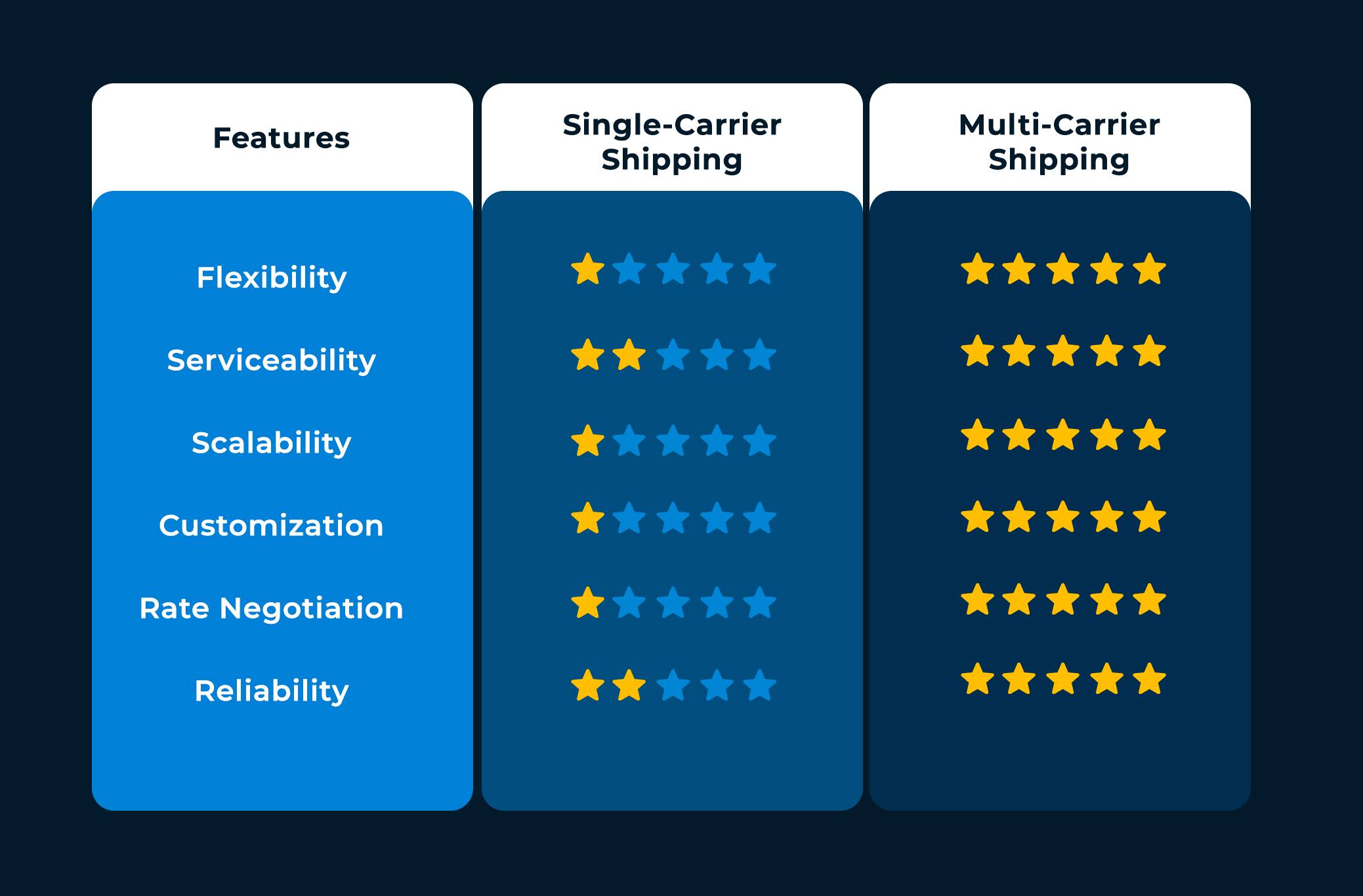
How does Logistics Management Software with Carrier Diversification offer Reliable Deliveries?
Today’s dynamic logistics management requires businesses to offer timely and reliable deliveries. The use of logistics management software helps them to streamline operations and ensure smoother deliveries. It not only helps automate logistical processes but also offers insights into the supply chain, enabling businesses to make data-driven decisions.

By harnessing the capabilities of logistics management software, businesses can gain visibility into their entire supply chain. The integration of real-time tracking and analytics features enables proactive decision-making, allowing businesses to anticipate and address potential disruptions before they escalate.
Don’t Miss: Top 7 Best Logistics Management Software Solutions – 2023
The multi-carrier parcel management software is set to grow from $604.3 million in 2023 to $1.52 billion by 2033.
Carrier diversification plays a pivotal role in the ability to deliver products promptly and reliably. It offers shippers/ dispatchers greater flexibility and resilience in the face of unforeseen challenges. Whether it’s optimizing delivery routes, negotiating favorable pricing agreements, or ensuring compliance with regulatory requirements, LogiNext’s effective carrier management is essential for staying ahead of the curve.
Enabling carrier management within logistics management software helps businesses unlock new opportunities for growth and efficiency. It’s not just about moving goods from point A to point B; it’s about orchestrating a seamless journey that adds value at every touchpoint.
What is Carrier Management?
Carrier management refers to the process of strategically selecting, evaluating, and managing transportation providers to optimize shipping efficiency and reduce costs. It involves various tasks such as negotiating contracts, tracking shipments, and resolving issues with carriers.
Example: LogiNext’s logistics management software helps with the allocation of carriers based on factors like service type, pricing, reliability, and coverage. By comparing carrier’s performance metrics, businesses can make informed decisions to select the most suitable carriers for deliveries.
Why is Carrier Management in Logistics Management Software Important for Shippers?
Amidst the vast array of features and functionalities in logistics management software, one aspect stands out: Carrier Diversification. Understanding the importance of diversifying carriers is paramount for ensuring seamless deliveries and maintaining a competitive edge in the market. Here are some of the use cases that showcase how shippers can benefit from using multi-carrier shipping.

Ensures timely deliveries: By diversifying carriers, shippers can mitigate the risk of delays caused by issues like capacity constraints or disruptions in a single carrier’s network.
70% of companies consider on-time delivery performance as a critical factor in measuring logistics effectiveness.
For example, if one carrier experiences a delay due to weather conditions, having alternative carriers in place ensures that shipments can still reach their destination on time.
Cost optimization: Leveraging multiple carriers allows shippers to negotiate competitive rates and avoid over-reliance on a single provider, thus reducing shipping costs.
Our study indicates carrier management strategies help achieve a 15-20% reduction in transportation costs
For example, by comparing rates charts and services offered by different carriers within our logistics management software, businesses can identify cost-saving opportunities. Our software will intelligently select the most cost-effective options for each shipment reducing manual intervention.
Enhanced flexibility: With carrier diversification, shippers have the flexibility to adapt to changing market conditions, route preferences, and customer demands.
78% of logistics managers agree that having multiple carrier options enhances their ability to respond to sudden changes in shipping requirements.
For example, QSR brands can easily switch carriers during peak hours/ holiday seasons to ensure timely deliveries to customers.
Risk management: By spreading shipments across multiple carriers, shippers can minimize the impact of potential disruptions such as natural disasters or labor strikes.
60% of businesses experienced disruptions in their supply chain due to unforeseen events.
For instance, if one carrier’s network is affected by a strike, shipments can be rerouted through other carriers to maintain continuity of service.
Improved customer satisfaction: Diversifying carriers enables shippers to offer a wider range of shipping options, including expedited or specialized services, catering to diverse customer needs and preferences.
86% of customers are willing to pay more for faster delivery options.
By partnering with multiple carriers, shippers/ dispatchers can offer flexible delivery options such as same-day or next-day delivery. This helps enhance customer satisfaction and brand loyalty.
Impact of Single-Carrier Shipping vs Multi-Carrier Shipping for Logistics Providers
Single-Carrier Shipping:
While offering simplicity in management, it presents several inherent risks and limitations due to reliance on a sole transportation provider. Understanding these drawbacks is crucial for shippers seeking to optimize their shipping strategies and mitigate potential disruptions. Below are the key points illustrating the challenges associated with single-carrier shipping.
– Higher dependency on a single provider.
– Vulnerable to disruptions in the carrier’s network.
– Limited negotiating power for pricing and service agreements.
– Potential for service limitations, such as restricted coverage areas or shipping options.
Multi-Carrier Shipping:
It offers businesses a more diversified approach to logistics management, providing numerous benefits with flexibility, efficiency, and customer satisfaction. By leveraging multiple carriers within their shipping network, companies can enhance their resilience to disruptions, optimize service levels, and gain a competitive edge in the market. The following points highlight the advantages associated with multi-carrier shipping.
– Reduced risk of delays and disruptions.
– Access to a broader range of service options and coverage.
– Ability to optimize shipping routes and service levels based on specific needs.
– Enhanced scalability to accommodate fluctuations in shipping volumes.
– Improved customer satisfaction through diverse delivery options and faster transit times.
– Increased competitiveness by leveraging carrier competition to negotiate better rates and service terms.

Choosing the Ideal Logistics Management Software for Reliable Deliveries
Having multiple carriers allows for better geographical coverage, ensuring that shipments can reach even remote locations efficiently. LogiNext’s multi-carrier shipping option enables shippers to leverage specialized carriers for certain types of goods or specific delivery requirements. We help evaluate and adjust your carriers based on performance metrics, market trends, and customer feedback.
So whether you need temperature-controlled transportation for perishable items or white-glove delivery for high-value products, we have you covered. Our carrier integration marketplace allows businesses to integrate with multiple carriers with our logistics management software. This enhances the overall efficiency and effectiveness of the supply chain, ultimately leading to improved business performance and customer satisfaction.
49







@LogiNext